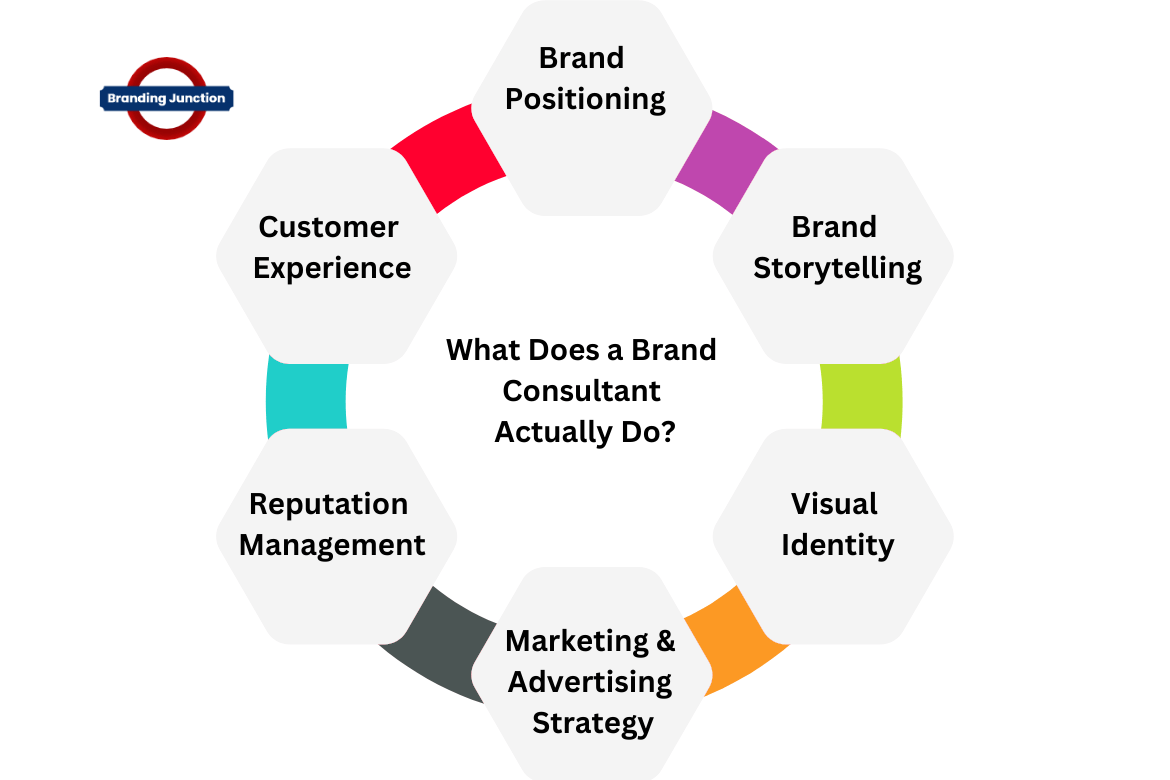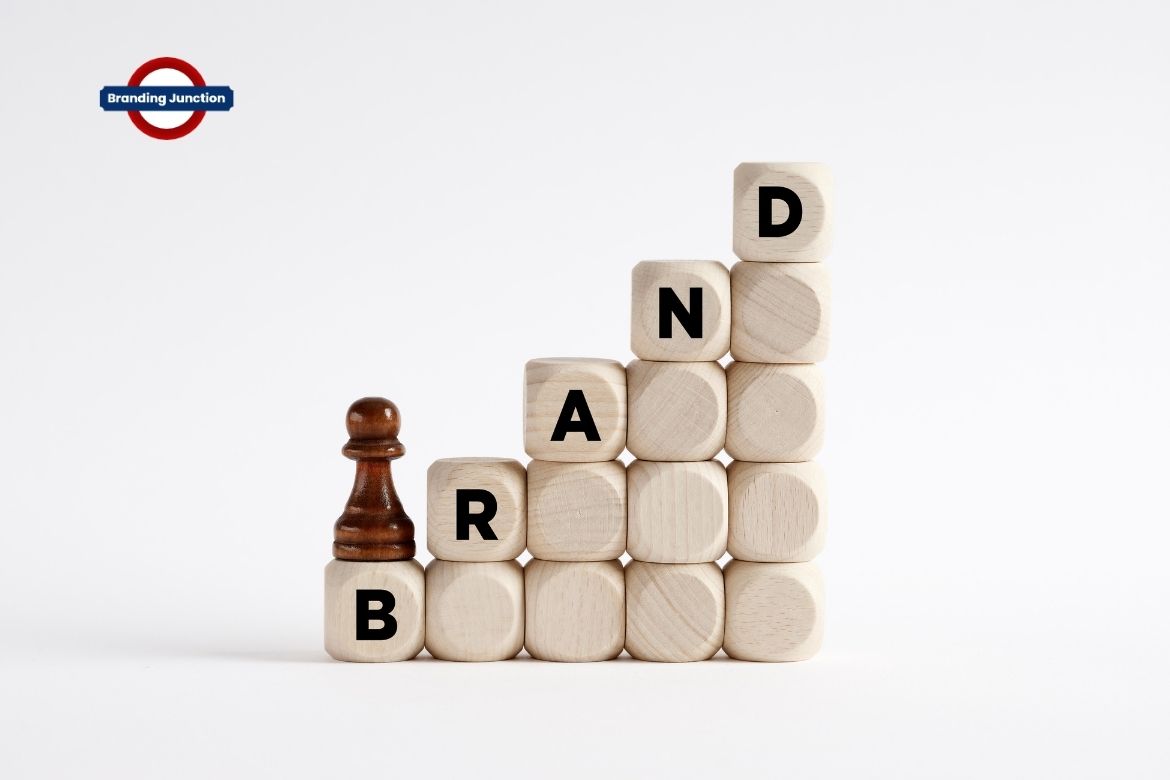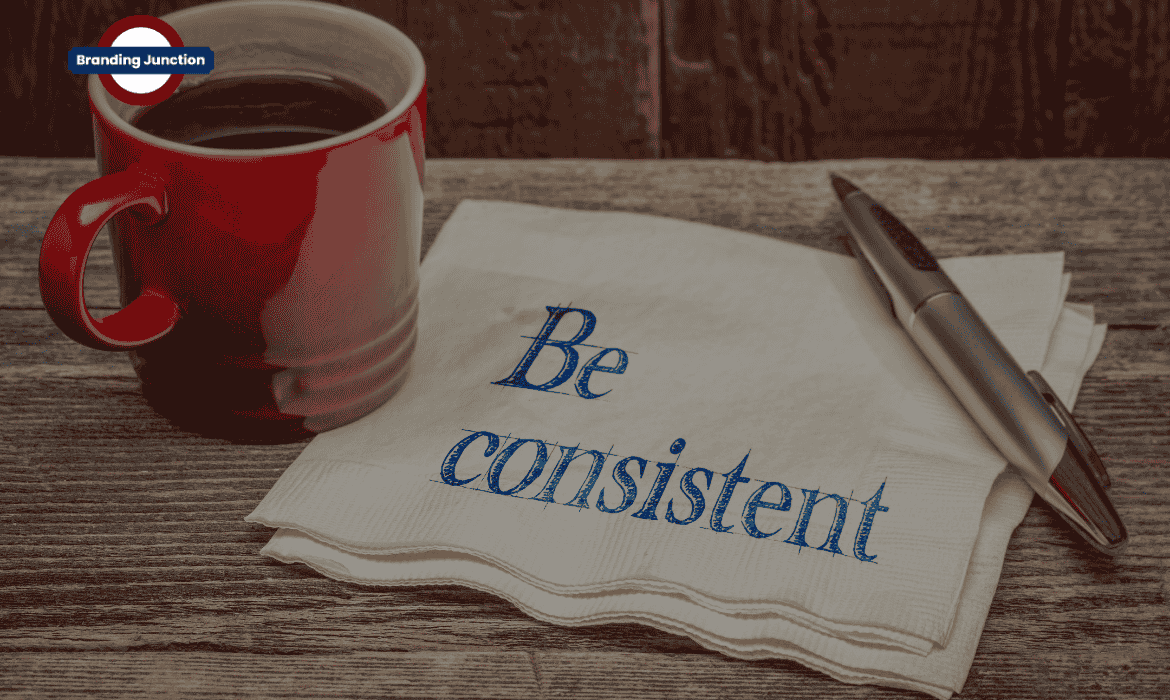What is Brand Consulting? And Why Does Your Business Need It?
In today’s world, running a business can feel like you’re constantly trying to stand out in a crowd. There’s so much noise, so many brands shouting for attention, and everyone seems to be doing something different. But here’s the thing—people don’t just buy products or services anymore. They buy stories, experiences, and values. And that’s where brand consulting comes in.
What Exactly is Brand Consulting?
Imagine brand consulting as your personal guide to shaping your company’s identity. It’s about figuring out who you are as a business and how to tell that story in a way that makes people care. A brand consultant is like that friend who really gets you—they sit with you, learn your journey, and help you communicate it so that it resonates with your audience.
Whether it’s choosing the right colors for your logo or defining the tone of your social media posts, brand consulting is about making sure everything about your business sends the right message. It’s not just about what you sell, but how you make people feel when they encounter your brand.


What Does a Brand Consultant Actually Do?
A brand consultant helps you with the nitty-gritty details of how your brand shows up in the world. Here are some key areas they focus on:
- Brand Positioning
They help you figure out where your brand stands in the market and what makes you different from everyone else. In short, they find your unique spot in the industry. - Brand Storytelling
Every business has a story, and a brand consultant helps you tell that story in a way that sticks. People want to connect with your brand on a deeper level, and storytelling helps you do just that. - Visual Identity
From your logo to the colors on your website, they guide the visual elements that make your brand recognizable and appealing to your target audience. - Marketing & Advertising Strategy
It’s not just about pretty designs; it’s about how you communicate your message. A consultant ensures that your advertising and marketing are aligned with your brand’s overall identity. - Customer Experience
Think of every touchpoint—your website, social media, even customer service. A brand consultant ensures that all these experiences are consistent and leave customers with a positive impression. - Reputation Management
In today’s world, your brand’s reputation can make or break your business. A brand consultant helps you manage public perception, ensuring that your brand remains credible and trustworthy. Whether it’s handling customer reviews or managing a PR crisis, they ensure your brand’s reputation stays strong.

Why Does Your Business Need Brand Consulting?
Now that we’ve covered what brand consulting is, let’s talk about why it matters. Why should you, as a business owner, even consider hiring a brand consultant? Let’s break it down.
1. Standing Out from the Crowd
Let’s face it—there are a ton of businesses out there, all trying to get the same customers. How do you make yours stand out? A brand consultant helps you carve out your unique identity, so when customers see your brand, they know exactly who you are and what you offer. It’s about making a lasting impression in a sea of choices.
2. Aligning Your Brand with Your Business Goals
Many businesses struggle with keeping their branding in sync with their goals. It’s easy to focus on short-term wins, but a brand consultant helps you see the bigger picture. They ensure that every decision you make about your brand supports your long-term vision, keeping your business on track.
3. Building Emotional Connections
At the end of the day, brands are about people, not just products. Customers don’t just buy things; they buy feelings. They want to connect with brands on a deeper level—whether that’s through shared values, a powerful story, or a sense of trust. A brand consultant helps you build those emotional connections by telling your story in a way that resonates.
4. Creating Consistency Across Platforms
In today’s digital world, your brand has to be everywhere—social media, your website, email marketing, ads. But consistency is key. If your brand feels different on Instagram than it does in your emails, customers might get confused. A brand consultant makes sure everything is aligned, no matter where people encounter your brand.
5. Driving Growth
At the end of the day, a strong brand drives business growth. When people connect with your brand on a deeper level, they’re more likely to choose you over competitors. Brand consulting helps you create the kind of brand that sticks in people’s minds and keeps them coming back.
Brand Consulting: It’s About People, Not Just Logos
When you really think about it, branding isn’t just about logos and slogans. It’s about people. It’s about how your brand makes people feel and how it fits into their lives. Think of it like building a relationship. You don’t just meet someone once and expect to become best friends overnight. You build trust, show consistency, and nurture that connection over time.
That’s what brand consulting does. It’s not just about creating a brand that looks good—it’s about creating a brand that people want to be part of, a brand that tells a story and evokes emotions. It’s about humanizing your business in a way that creates lasting relationships with your audience.
Conclusion: It’s All About Connection
Brand consulting isn’t some dry, technical process. It’s about connecting with people. Whether you’re a startup looking to build your brand from scratch or an established business in need of a refresh, brand consulting can help you find your voice, tell your story, and create lasting connections with your audience.
Because at the end of the day, the brands that succeed aren’t the ones with the flashiest logos or the biggest budgets—they’re the ones that make people feel something. And that’s what brand consulting is all about.
That’s what brand consulting does. It’s not just about creating a brand that looks good—it’s about creating a brand that people want to be part of, a brand that tells a story and evokes emotions. It’s about humanizing your business in a way that creates lasting relationships with your audience.
“Your brand is the story people tell about you when you’re not in the room.”
— Jeff Bezos
Brand Consistency: Why It’s Key to Building Trust and Loyalty
At its core, brand consistency is about making sure everything about your brand feels cohesive—whether someone is visiting your website, seeing a social media post, or reading your email newsletter. It’s not just about using the same colors or logo (although that’s important); it’s about making sure your tone, messaging, and overall identity are aligned across every platform and touchpoint.
In short, it’s about ensuring that no matter where your customers encounter your brand, they get the same experience.
Why Does Brand Consistency Matter?
1. Building Trust with Your Audience
Consistency builds trust. Think about it—when people see the same messaging, tone, and visual identity across your social media, website, and ads, they know what to expect from you. That reliability makes them feel confident in choosing your brand.
Trust is the foundation of any strong relationship, and in branding, it’s no different. By staying consistent, you show your audience that your brand is dependable and professional. And when people trust your brand, they’re much more likely to choose you over competitors.
2. Strengthening Brand Recognition
How often have you recognized a brand just by seeing a glimpse of its logo or color scheme? That’s the power of brand recognition. When you’re consistent with your branding, it becomes easier for customers to identify your brand, even in a crowded marketplace.
The more people see a unified, recognizable brand, the more it sticks in their minds. Over time, that consistent presence helps establish your brand as a familiar and trusted option, keeping you top-of-mind when customers are ready to make a purchase.
3. Creating Emotional Connections
People don’t just engage with brands because of their products or services—they engage because of how the brand makes them feel. When your messaging, tone, and visuals are consistent, you create a stronger emotional connection with your audience.
A brand that feels familiar and reliable helps customers feel more comfortable. It’s like talking to an old friend who you know won’t surprise you with anything unexpected. That emotional bond keeps customers coming back and can even turn them into loyal advocates for your brand.
4. Supporting Clear Communication
Imagine trying to follow a conversation where the tone and message change every few minutes—it would be confusing, right? The same thing happens when your branding is inconsistent. If your message is scattered across platforms, customers might struggle to understand who you are and what you stand for.
Brand consistency ensures that your message comes through clearly, no matter where your customers encounter it. Whether it’s on Instagram or in an email, people should know exactly what you’re about. A clear, consistent message helps avoid confusion and makes it easier for your audience to connect with your brand’s values.


How to Maintain Brand Consistency
So, how do you actually keep your brand consistent? Here are a few key steps:
1. Create Brand Guidelines
Brand guidelines are like a roadmap for your brand. They outline everything from your logo and color scheme to the tone of voice you should use in communication. Having these guidelines ensures that everyone working on your brand is on the same page, whether they’re designing a new ad campaign or writing a blog post.
2. Maintain a Consistent Tone
Your brand’s voice is just as important as its visual identity. Whether you’re witty, formal, or friendly, make sure that tone comes through in all your communications. Consistency in tone helps reinforce your brand’s personality and keeps your messaging aligned.
3. Stay True to Your Core Values
As your brand evolves, it’s important to stay grounded in your core values. These values should guide everything you do, from marketing strategies to customer interactions. When your brand consistently reflects its values, customers feel a deeper connection to your mission and purpose.

The Long-Term Benefits of Brand Consistency
Maintaining brand consistency isn’t just about making things look or sound nice—it’s about driving real, long-term benefits for your business.
When customers recognize and trust your brand, they’re more likely to become repeat buyers. And it doesn’t stop there—loyal customers often become advocates, spreading the word about your brand and bringing in new customers through recommendations.
Brand consistency also makes it easier to introduce new products, services, or campaigns. If your brand identity is strong, customers are more likely to embrace whatever new direction you take, knowing that it aligns with the brand they already trust.
Brand Consistency: The Foundation of Lasting Loyalty
At the heart of every successful brand is a consistent, clear identity. It’s what turns first-time buyers into repeat customers and casual followers into loyal brand advocates. When your brand stays true to itself across every platform and interaction, you create a lasting connection with your audience.
Remember, your brand is more than just a logo or slogan—it’s how people experience your business. And when that experience is consistent and meaningful, it becomes a foundation for long-term success.
Conclusion: Consistency Is Key
Building a brand that people trust and recognize doesn’t happen overnight, but maintaining consistency is one of the most powerful tools in your toolkit. Whether you’re just starting out or looking to refine your brand, consistency will help you build trust, strengthen recognition, and foster loyalty.
Remember, your brand is more than just a logo or slogan—it’s how people experience your business. And when that experience is consistent and meaningful, it becomes a foundation for long-term success.
“Consistency is what transforms average into excellence.”
— Tony Robbins
Marketing: The Art of Connecting with Your Audience
Marketing isn’t just about selling a product or service—it’s about creating a meaningful connection with your audience. Imagine a world where every brand speaks directly to the needs, desires, and emotions of its customers. That’s what great marketing does. It taps into the heart of what people want, building relationships that go beyond the transaction.
In this blog, we’ll explore the true essence of marketing, why it’s crucial for businesses, and how it shapes the success of brands.
What Is Marketing?
At its core, marketing is the art and science of attracting, engaging, and satisfying customers. It’s not just about advertisements or promotions; it’s the whole process of understanding your audience and delivering value to them in a way that meets their needs. From market research to branding, social media to email campaigns—marketing encompasses everything a business does to communicate with its customers.
But more than anything, marketing is about telling a story. It’s about helping your audience see how your product or service fits into their lives and solves their problems. It’s about showing them why they should care.


Why Is Marketing Essential?
Marketing is the lifeblood of any business. No matter how good your product or service is, without effective marketing, people won’t know it exists. And if they don’t know it exists, they can’t buy it.
Here are a few reasons why marketing is so crucial:
1. Creating Awareness
The first step to any sale is awareness. People need to know your brand, product, or service exists before they can make a purchase. Marketing spreads the word, letting potential customers know what you offer and why it’s valuable to them.
2. Building Relationships
Marketing is about more than just getting people to buy—it’s about building lasting relationships with your customers. Whether through engaging content, social media interactions, or email newsletters, marketing allows you to stay connected with your audience and keep them engaged over time.
These relationships help build trust, which is essential for turning one-time buyers into loyal customers.
3. Driving Growth
When done right, marketing directly contributes to the growth of your business. It brings in new customers, increases sales, and boosts your brand’s visibility in the market. More importantly, marketing creates a sustainable path for growth, ensuring that your business stays relevant and competitive in a constantly evolving marketplace.
4. Creating Value
Marketing isn’t just about what you’re selling—it’s about the value you’re creating for your customers. Whether it’s solving a problem, meeting a need, or enhancing their lives, marketing helps communicate that value in a way that resonates with your audience. When people understand the value you offer, they’re more likely to engage with your brand.

The Evolution of Marketing: Adapting to a Digital World
Over the past few decades, marketing has undergone a dramatic transformation. With the rise of the internet and social media, traditional marketing methods have given way to new, digital strategies.
1. Digital Marketing
Today, digital marketing is one of the most powerful tools for reaching your audience. From SEO and content marketing to paid ads and social media, digital marketing allows businesses to target specific groups of people with precision. This shift has made marketing more personalized and data-driven than ever before.
2. Social Media Marketing
Social media has become a key player in modern marketing. Platforms like Instagram, Facebook, LinkedIn, and TikTok have allowed brands to interact with their audience on a more personal level. Through social media, brands can share their stories, showcase their products, and engage directly with customers, building a sense of community and connection.
The Evolution of Marketing: Adapting to a Digital World
1. Understanding Your Audience
The most successful marketing campaigns start with a deep understanding of the target audience. What are their pain points? What motivates them? Where do they spend their time online? Understanding these key elements allows marketers to create messages that resonate with their audience.
2. Storytelling
People connect with stories, not products. The most impactful marketing campaigns are those that tell a story—whether it’s about a brand’s origins, its mission, or the ways in which its product can improve someone’s life. Storytelling humanizes your brand, making it more relatable and engaging.
3. Consistent Messaging
Consistency is key in marketing. Whether it’s your brand’s voice, visuals, or message, staying consistent helps build trust with your audience. If your marketing message changes too often, it can confuse potential customers and erode the relationship you’ve built.
4. Data-Driven Decisions
Today’s marketing is as much about analytics as it is about creativity. Marketers use data to understand customer behavior, track campaign performance, and adjust strategies in real-time. Data-driven marketing ensures that you’re not just guessing what works—you’re making informed decisions based on measurable results.
How Marketing Impacts Your Brand?
Your marketing strategy has a direct impact on your brand’s reputation and perception in the market. Here’s how:
1. Building Brand Identity
Marketing defines how your brand is perceived by the world. Through marketing, you can craft a unique identity that sets you apart from competitors. Whether it’s your logo, color scheme, tone of voice, or the story you tell, marketing creates a cohesive identity that resonates with your target audience.
2. Establishing Authority
Effective marketing can position your brand as an expert in your industry. By consistently sharing valuable content, insights, and thought leadership, you build credibility and authority. This not only helps attract customers but also fosters trust and loyalty.
3. Generating Word-of-Mouth
One of the most powerful forms of marketing is word-of-mouth. When customers have a positive experience with your brand, they’re likely to share it with others—whether through social media, reviews, or personal recommendations. Word-of-mouth marketing is free, authentic, and incredibly influential.
How to Create an Effective Marketing Strategy?
Now that we’ve discussed the importance of marketing, let’s talk about how to create a successful marketing strategy:
1. Set Clear Goals
Start with specific, measurable goals. Do you want to increase website traffic? Generate more leads? Build brand awareness? Your marketing strategy should be designed to achieve these objectives.
2. Know Your Audience
Understand who your ideal customer is. Use research, surveys, and data analysis to build a clear profile of your target audience. Knowing their habits, preferences, and needs will help you craft more effective marketing messages.
3. Choose the Right Channels
Not every platform or marketing method is right for every brand. Based on your audience and goals, choose the marketing channels that will be most effective—whether it’s social media, email marketing, content creation, or paid advertising.
4. Monitor and Adapt
Marketing isn’t a one-and-done activity. Continuously monitor the performance of your campaigns, track key metrics, and make adjustments based on the data. Staying flexible and adapting to what works will keep your marketing efforts effective.
The Future of Marketing: Where Are We Headed?
The world of marketing is always evolving. As technology continues to advance, so too will the ways in which brands reach and engage with their audience.
Expect to see continued growth in areas like AI-driven marketing, personalization, and immersive experiences through augmented reality (AR) and virtual reality (VR). Brands will need to stay agile and innovative, finding new ways to connect with an increasingly digital and mobile-first audience.
Conclusion: The Power of Connection
At its heart, marketing is about connecting with people. It’s about understanding what they need, delivering value, and building relationships that go beyond the product. When done right, marketing can elevate your brand, drive growth, and foster lasting loyalty. In an ever-changing world, it remains one of the most powerful tools for business success.
“Marketing is no longer about the stuff you make, but the stories you tell.”
— Seth Godin



